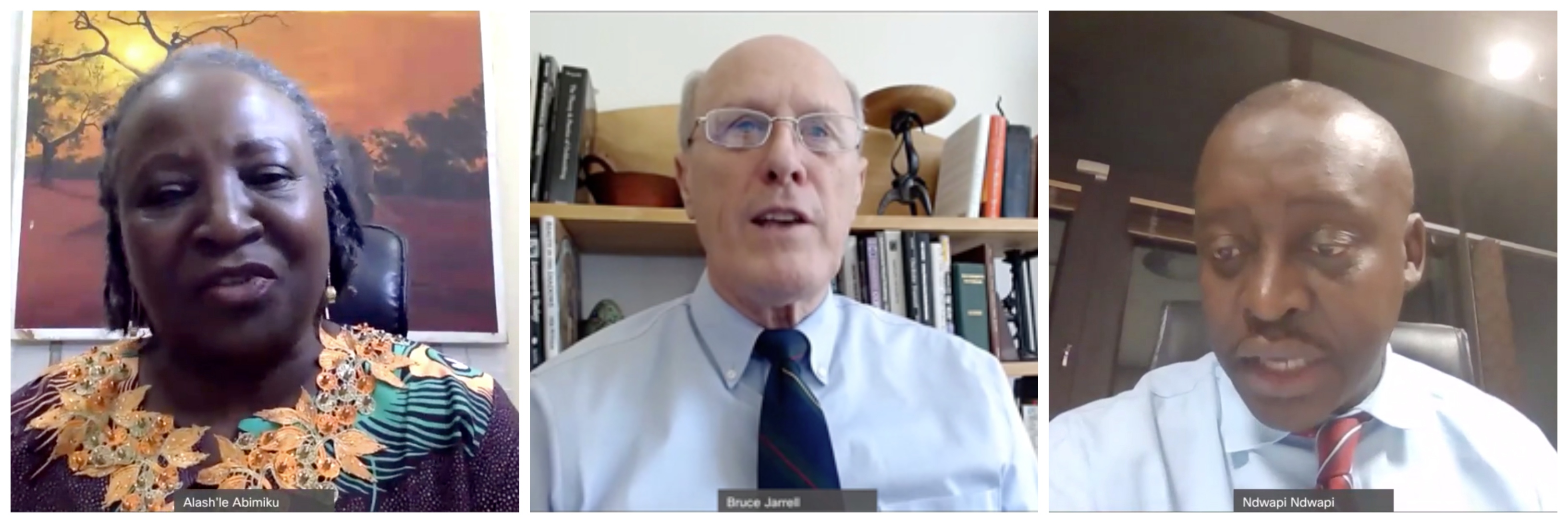July 2020
For the past couple of months, researchers and health professionals around the world have been dealing with the fallout from the COVID-19 pandemic. One by one, countries around the globe have had to cope with unprecedented challenges including soaring case numbers, overrun hospitals, and a lack of testing kits and personal protective equipment.
In the face of this pandemic, coordinated global support is essential and low-resource countries on the African continent are particularly vulnerable. The University of Maryland School of Medicine’s (UMSOM) Center for International Health, Education, and Biosecurity (Ciheb) in Africa has been playing a key role in utilizing resources to respond to the COVID-19 pandemic, while also staying consistent with HIV surveillance and treatment programming during this challenging time.
The July 9 edition of Virtual Face to Face with Dr. Bruce Jarrell featured two leaders of Ciheb who discussed how they are carrying out the fight against infectious disease in Africa, and what lessons they have learned from past disease outbreaks that may help guide efforts in the United States.

Alash’le Abimiku, PhD, Bruce E. Jarrell, MD, FACS, and Ndwapi Ndwapi, MD.
Joining University of Maryland, Baltimore Interim President Bruce E. Jarrell, MD, FACS, live from Nigeria and Botswana were Alash’le Abimiku, PhD, professor of medicine, Institute of Human Virology (IHV), UMSOM; executive director, International Research Centre of Excellence at IHV-Nigeria; and senior technical advisor, laboratory services, Ciheb; and Ndwapi Ndwapi, MD, country director, Ciheb-Botswana.
Abimiku and Ndwapi started the event by discussing how COVID-19 is affecting their respective countries. Abimiku explained that Nigeria’s first few cases were discovered in mid-February including several cases in Lagos, a very populous city with over 20 million people. The Nigerian Centers for Disease Control (CDC) was quick to react with quarantine orders and contact tracing strategies.
“I think the virus would have spread much more rapidly if it hadn’t been for the response in Lagos,” said Abimiku. “Lagos had a prior history of containing the Ebola outbreak, so the country’s epidemiology and emergency response team was really strong and intervened very fast by closing down borders and putting shutdowns in place across several states.”
Abimiku also explained that UMB’s IHV was immediately pulled into the containment efforts and was essential in setting up testing sites and a surveillance programs.
“We were in the mix very early,” she said. “Fortunately, the platform for testing for COVID-19 was very similar to what we had already set up in the country for testing for HIV, so all of our trained Nigerian colleagues turned our molecular labs into COVID testing labs.”
In Botswana, Ndwapi said that his country had about 277 confirmed cases and the majority of them were truck drivers who were diagnosed coming across the border from South Africa. He credits those low numbers to preparedness efforts from Botswana leadership, which started months ago when cases were starting to emerge in China.
“Right from the beginning there was a presidential call with 19 task force members and that became the command center for the entire response to the pandemic,” said Ndwapi.
The task force worked to create national standard operating procedures for health, business, transport, etc. in response to COVID-19. The task force also reviewed the country’s legislative framework for public health and created short- and long-term projections for strategic needs such as food, fuel, medicine, and personal protective equipment.
“This preparedness effort was the foundation of our response and it was simultaneously implemented with the World Trade Organization prevention approaches,” he said. “We also used social media as a vehicle for prevention early on.”
Their discussion about the global fight against infectious diseases drew audience members from around the world, including colleagues from Kenya and Zambia who tuned in to join the conversation.
Watch the entire program by accessing the link above.
Search UMB News
Sign up for UMB Alerts.



